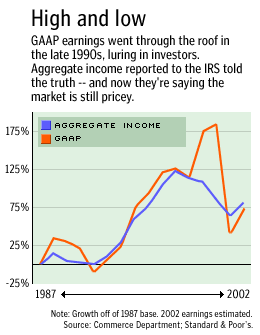NEW YORK (CNN/Money) - If U.S. companies had told investors what they told the Internal Revenue Service, all the problems of the past few years might not have happened.
And if U.S. companies started telling investors what they tell the IRS now? Then stocks might fall further still.
Trying to figure out what companies really earn has lately been something of a holy grail. Because the" pro forma" earnings in press releases often exclude one-time charges, many Wall Streeters feel they are inflated. Earnings revealed in SEC documents under generally accepted accounting principles, or GAAP, are better -- but they can be incredibly volatile, and critics complain they don't properly account for stock options.
All of which adds to the uncertainty plaguing Wall Street -- it's hard to figure out what the market's price-to-earnings ratio is if you're not too sure about the earnings part.
But maybe there is a way out of the fix: companies could issue the earnings they report to the IRS to their shareholders.
"That would be really nice," said James Montier, global investment strategist at Dresdner Kleinwort Benson. "It would be called honest. But, of course, they can't do that sort of thing because it's much more fun to create your own numbers."
The numbers game
In the late 1990s, taxable income reported to the IRS would have shown that the stupendous earnings growth of those times was less than it seemed.
For many years growth in aggregate profits for non-financial companies, based on tax information, and growth in S&P 500 profits according to GAAP matched up very well. But then, in 1999, aggregate taxable earnings slipped by 2 percent, according to the Commerce Department, while S&P 500 GAAP earnings swelled by 28 percent.

"The aggregate profit data started to fall outright and nobody wanted to hear about it," said Natexis Bleichroeder economic strategist James Padinha. "But it sure would have made it hard to keep 40 percent of your portfolio in tech stocks if you'd paid attention."
In 2000, again, earnings under GAAP were up, and earnings according to the government fell. But in 2001 there was a sharp adjustment: the government data showed a 12 percent drop in earnings, but S&P 500 earnings fell by 51 percent. Now it looks like the two are more or less in line again.
There goes the rationalization
For investors, that may not be particularly good news.
When trying to explain away still-high valuations, the bulls argue that GAAP earnings are unduly depressed. There are all those one-time charges -- like the $98.7 billion CNN/Money parent AOL Time Warner booked in 2002 -- that reflect the excesses of the go-go years more than present problems.
And maybe there's some truth in this. From 1987 to 2002, S&P 500 earnings under GAAP grew 73 percent. But, in the same period, the government's profit data (using estimates based on the first three quarters of 2002) grew by 82 percent, suggesting the GAAP earnings are somewhat depressed.
Now, let's say S&P earnings grew not at the pace GAAP currently suggests, but at the same pace as non-financial company earnings grew economy wide. Then you get a price-to-earnings ratio for the S&P of 26 -- better than the 27.7 you get using GAAP, but still high compared to historic norms and well above the 17.7 you get based on the pro-forma numbers companies would like you to use.
Of course, such little exercises might not be necessary if companies let their owners, the shareholders, know what their taxable income was. Even though those numbers would also be skewed by the various tax credits businesses receive for environmental initiatives and the like, points out Harvard Business School professor David Hawkins, they would give a far better indication of cash flows than what's currently available.
And at the very least it might offer investors a red flag when earnings aren't what they seem, like in 1999.
"We could have asked the question, 'Why is your taxable income going down when your income according to GAAP is heading up,'" said Hawkins. "The answer might have been very interesting."

|

